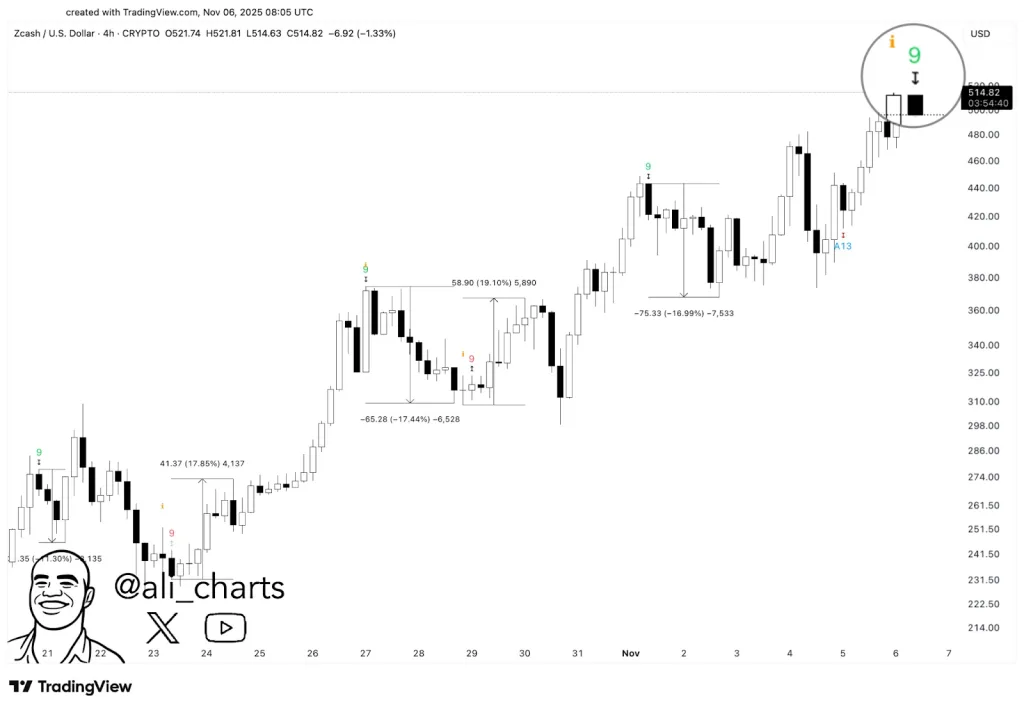Arthur Hayes, the former BitMEX chief executive, has renewed his bullish call on Zcash (ZEC), naming it one of the few digital assets likely to thrive when the next wave of market liquidity arrives. He believes privacy-focused coins could take the lead as governments and central banks expand digital-payment oversight and deepen financial surveillance. To Hayes, Zcash represents a safeguard against that shift, a return to the cypherpunk values that once defined Bitcoin’s early days. Hayes predicts that ZEC could climb to $1,000, fueled by rising global interest in privacy-focused cryptocurrencies.
He pointed to Zcash’s underlying technology, built on zero-knowledge proofs, which lets users move funds without exposing who they are or how much they send. Hayes said that kind of privacy could soon matter more than ever as central banks fast-track their digital-currency programs. He has described Zcash as "the clean privacy bet" among top crypto assets, one that blends strong engineering with an old-school ethos of financial independence.
ZEC’s price action seems to back his confidence. The coin recently touched $500, up more than 700 percent since late September, overtaking Monero as the largest privacy coin by market value.
Technical Patterns Reveal Persistent Strength
Market analyst Ali Charts shared data on X showing that ZEC continues to hold firm despite volatile swings. On the four-hour TradingView chart, the token traded near $514.82, down about 1.33 percent, after hitting an intraday high of $521.81. A series of TD Sequential 9 signals appeared, often an early sign that the rally may pause before the next leg higher.

The chart captures several sharp moves: a 17.85% jump from $231.35, a pullback of 17.44 percent (-65.28 points), then a rebound of 19.10% (+58.90 points). A later correction of 16.99% (-75.33 points) came just before ZEC pushed back above the $500 mark. Holding that level, analysts say, shows that buyers are still stepping in even as exhaustion signals flash.
Privacy Debate Revives Interest in Zcash
Momentum inside the Zcash ecosystem has also been building. Zooko Wilcox, the former Electric Coin Company CEO, joined Shielded Labs to help guide Zcash’s shift toward a hybrid proof-of-stake model. That transition aims to make the network more scalable and energy-efficient while preserving its privacy layer.
Meanwhile, Europe’s growing debate over a digital euro has fueled public concern about what state-issued currencies could mean for personal control. The idea of central banks having direct access to digital wallets has unsettled many citizens and investors alike. Those fears have driven new demand for privacy-based tokens such as Zcash and Monero.
Analysts tie the trend back to Hayes’s broader argument: when monetary policy turns toward easing and liquidity expands, assets that protect anonymity and fungibility may outperform. Still, the share of fully shielded Zcash transactions remains modest, and regulators in several countries continue to scrutinize anonymous-coin activity.
Hayes, however, sees Zcash as more than a price play. To him, it’s a hedge against a financial future where liquidity flows freely—but privacy does not. As global money systems evolve, one question lingers: could privacy become crypto’s most valuable feature again?

